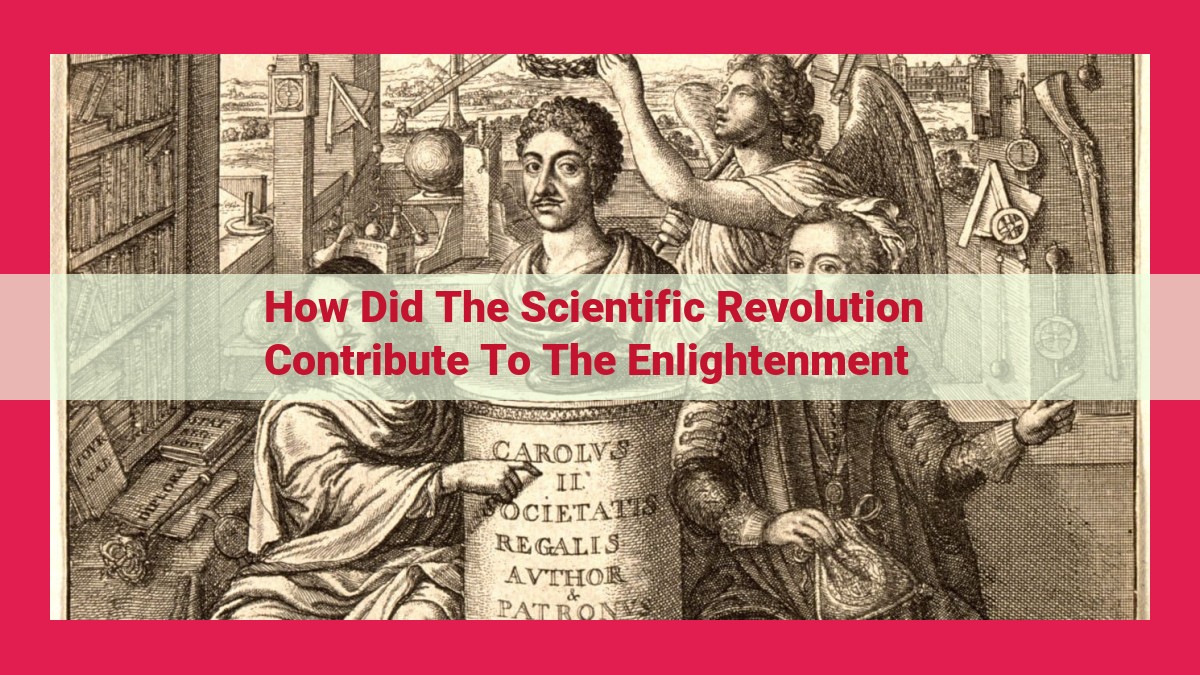Scientific Revolution Laid The Groundwork For The Enlightenment: Rationalism, Empiricism, And The Challenge Of Authority

The Scientific Revolution (16th-17th centuries) laid the foundation for the Enlightenment (18th century) by emphasizing rationalism, empiricism, and natural laws. This challenged traditional beliefs and authority, promoted scientific reasoning, and led to the belief in a rational, orderly universe. Scientific discoveries and advances in mathematics and physics provided a framework for rational analysis and prediction. The dissemination of knowledge through the printing press and scientific societies furthered the Enlightenment, influencing social and political theory by promoting individual liberties, limited government, and democratic institutions. The Scientific Revolution fostered a belief in human progress and improvement, challenging traditional authority and paving the way for Enlightenment ideas and reforms.
The Scientific Revolution: Prelude to the Enlightenment
The Scientific Revolution, a transformative era spanning the 16th and 17th centuries, laid the foundations for the Enlightenment, an intellectual movement that would profoundly shape Western thought. This revolution challenged traditional beliefs and sowed the seeds of rationalism, empiricism, and natural laws.
During the Scientific Revolution, rationalism emerged as a central tenet. Scholars believed that logic and reason could uncover the truths of the natural world. The scientific method, a process of observation, experimentation, and logical deduction, became a cornerstone of this approach. It encouraged the critical examination of established beliefs and the pursuit of knowledge through observation and experimentation.
Empiricism, another key principle of the Scientific Revolution, emphasized sensory experience as the ultimate source of knowledge. Scholars believed that true knowledge could only be gained through direct observation of the natural world, rather than mere reliance on authority or tradition. This emphasis on evidence-based reasoning paved the way for a more objective and scientific understanding of the world.
The Scientific Revolution also fostered a belief in natural laws, a principle that would later influence Enlightenment thinkers. Scientists discovered that the universe operates according to predictable and discoverable laws, suggesting a rational and orderly cosmos. This belief in a benevolent Creator who governed the universe through these laws challenged traditional religious dogma and laid the groundwork for the Enlightenment’s deistic worldview.
The Scientific Revolution and the Rise of Rationalism
The Scientific Revolution transformed the intellectual landscape of the 16th and 17th centuries, laying the groundwork for the Enlightenment. At its core was a shift from traditional beliefs based on authority to a new emphasis on rationalism and empiricism.
The Challenge to Tradition
Before the Scientific Revolution, knowledge was largely derived from religious dogma and ancient texts. Authority figures, such as the Church, held sway over scientific thought. However, the Scientific Revolution ushered in a new era of critical thinking.
The Scientific Method
One of the key developments of the Scientific Revolution was the introduction of the scientific method. This systematic process involved making observations, formulating hypotheses, conducting experiments, and analyzing results to establish scientific truths.
Logical Reasoning
The Scientific Revolution also emphasized the importance of logical reasoning. Scientists began to rely on deductive and inductive logic to draw conclusions from their observations and experiments. This logical approach allowed them to challenge traditional beliefs that had been accepted uncritically.
The Shift to Rationalism
As the Scientific Revolution progressed, rationalism gained prominence. This philosophical approach held that reason alone was the source of all knowledge. Rationalists believed that the universe could be understood through logical thought and deduction.
The Scientific Revolution’s emphasis on rationalism and the scientific method challenged traditional beliefs based on authority. By introducing a systematic approach to knowledge acquisition, the Scientific Revolution paved the way for the Enlightenment’s pursuit of human reason and progress.
Empiricism and Sensation: The Cornerstone of Enlightenment Thought
The Scientific Revolution, a period of remarkable intellectual upheaval, marked a profound shift in the way humanity perceived the world. At its core lay the groundbreaking idea that sensory experience, rather than blind faith or dogma, could be the catalyst for true knowledge.
Challenging the Dogma of Authority
For centuries, knowledge had been dictated by religious institutions and their interpretations of ancient texts. However, the Scientific Revolution introduced a new approach: empiricism. This radical concept emphasized the importance of observation and experimentation as the foundation of scientific inquiry. Scientists like Francis Bacon and René Descartes believed that direct sensory experience, not abstract ideas, held the key to understanding the natural world.
The Power of the Senses
This newfound emphasis on sensory evidence paved the way for groundbreaking discoveries. Through careful observation and experimentation, scientists began to unravel the secrets of the physical world. They discovered the laws of motion, the properties of light, and the workings of the human body. Sense perception, once dismissed as unreliable, became the cornerstone of a new era of exploration and understanding.
Evidence-Based Reasoning
The Scientific Revolution shifted the focus from abstract speculation to concrete, verifiable facts. Evidence-based reasoning became the guiding principle for scientific inquiry. Scientists no longer relied on secondhand accounts or hearsay; they demanded empirical proof to support their claims. This rigorous approach laid the foundation for the development of the scientific method, which remains the gold standard of knowledge acquisition today.
The Enlightenment’s Seeds
Empiricism and sensory experience had a profound influence on the Enlightenment, a period of intellectual and cultural transformation that followed the Scientific Revolution. The Enlightenment thinkers, inspired by scientific principles, challenged traditional beliefs and advocated for the power of rational inquiry. The Scientific Revolution provided them with a new intellectual framework, empowering them to question authority, embrace reason, and seek progress through observation and experimentation.
Natural Law and Deism: The Scientific Genesis of Enlightenment Faith
In the realm of the Scientific Revolution, a profound shift occurred, not only in the realm of scientific inquiry but also in the realm of belief. As scientific discoveries unraveled the intricate tapestry of the universe, they ignited a spark that illuminated the path towards a new understanding of God and the cosmos.
The laws of nature that governed the celestial bodies and the physical world seemed to operate with clockwork precision, revealing an orderly and rational design. This discovery instilled in scientists and philosophers a profound sense of awe and wonder, leading them to embrace the concept of a benevolent Creator.
This Creator, they reasoned, was not an arbitrary or vengeful deity, but rather a rational and benevolent being who had set in motion the laws of nature, allowing the universe to unfold harmoniously. This belief in a rational and orderly universe, governed by a benevolent God, became known as Deism.
Deism offered a stark contrast to the traditional religious dogmas of the time, which often relied on revealed knowledge and superstition. It emphasized the power of human reason and the importance of observing and understanding the natural world. This scientific approach to faith profoundly influenced the Enlightenment, fostering a belief in progress, rationalism, and the innate goodness of humanity.
Advancements in Mathematics and Physics: Enlightenment’s Toolkit for Reason
The dawn of the Scientific Revolution ignited a surge of curiosity and a profound shift in the pursuit of knowledge. Mathematics and physics ascended as pillars of the Enlightenment, providing a rigorous framework for rational analysis and predictive reasoning.
Advancements in mathematics, spearheaded by Isaac Newton and Gottfried Leibniz, gifted the world with calculus. This _revolutionary** tool enabled scientists to mathematically describe complex phenomena such as the motion of celestial bodies and the flow of liquids. Calculus empowered the Enlightenment with the ability to quantify, analyze, and predict the intricacies of the natural world.
Simultaneously, breakthroughs in physics, led by Galileo Galilei and Johannes Kepler, shattered Aristotelian dogma. Galileo’s experiments and observations revealed the laws of motion and gravity, while Kepler’s elliptical orbits revolutionized astronomy. These discoveries instilled a profound belief in the orderliness and predictability of the universe, further strengthening the Enlightenment’s emphasis on rationality.
Mathematical and physical advancements extended beyond the realm of natural phenomena. Scientists applied these tools to study social and economic patterns, paving the way for the development of statistics. This novel field enabled Enlightenment thinkers to analyze societal trends, quantify human behavior, and lay the groundwork for evidence-based decision-making.
In conclusion, advancements in mathematics and physics served as a gateway to the Enlightenment’s triumphant march of reason. Calculus, the laws of motion, and statistical analysis empowered Enlightenment thinkers with the tools to decipher the mysteries of the universe, challenge established beliefs, and lay the foundation for scientific progress that continues to shape our world today.
Dissemination of Scientific Knowledge: Fueling the Enlightenment
The Scientific Revolution ignited a thirst for knowledge and reason, and its discoveries needed to be shared far and wide. Enter two game-changing inventions: the printing press and scientific societies.
The Printing Press: Spreading Ideas Like Wildfire
Like a wildfire spreading through a dry forest, the printing press revolutionized the dissemination of information. Suddenly, Enlightenment ideas could be printed in mass quantities and distributed to a wider audience. Books, pamphlets, and scientific journals became the conduits for the exchange of knowledge and the fueling of intellectual curiosity.
Scientific Societies: Hubs of Collaboration and Debate
Alongside the printing press, scientific societies emerged as vibrant hubs where scholars and thinkers gathered, debated, and exchanged ideas. Royal societies, academies, and learned associations provided a platform for the rigorous examination of scientific theories and the sharing of cutting-edge research.
The Seeds of Enlightenment Scattered Across Europe
With knowledge flowing freely through the printing press and scientific societies, the ideas of the Enlightenment spread rapidly across the European continent. Intellectuals, scholars, and curious minds alike devoured the latest scientific discoveries and engaged in lively debates. Libraries and universities became the breeding grounds for new knowledge, and a thirst for rationalism, empiricism, and natural law permeated society.
The dissemination of scientific knowledge was the lifeblood of the Enlightenment. It propelled ideas forward, transformed societies, and set the stage for an era of unprecedented intellectual progress.
Scientific Principles and Social-Political Transformation
The Scientific Revolution sparked a profound shift in human thought, laying the groundwork for the Enlightenment. It challenged traditional beliefs and authority, introducing rationalism, empiricism, and natural laws. These principles not only transformed scientific understanding but also permeated social and political theory.
The emphasis on reason led to a critical examination of social institutions. Enlightenment thinkers like Locke and Rousseau argued that individuals possess natural rights, derived from reason and observation. They challenged the notion of absolute monarchy, advocating for limited government, based on consent.
The Scientific Revolution’s focus on empiricism encouraged a reassessment of social and political practices. Enlightenment philosophers believed that knowledge should be based on evidence and observation, rather than on tradition or blind faith. They promoted reforms based on rational inquiry and evidence-based policy.
Scientific discoveries also impacted the concept of political legitimacy. Newton’s laws of physics revealed a rational, orderly universe, leading to the deistic belief in a benevolent Creator. This belief influenced political theory, emphasizing that governments should be based on reason and natural law.
The Enlightenment’s emphasis on progress and human capability inspired social and political movements. Enlightenment thinkers believed that human reason had the power to improve society. They advocated for education, social reform, and the establishment of democratic institutions.
The Scientific Revolution and Enlightenment thus had a profound impact on social and political theory. Its principles of rationalism, empiricism, and natural laws transformed the way people thought about society and government, fostering the belief in individual liberties, limited government, and the power of human reason. These ideas continue to shape modern political thought and the pursuit of a more just and equitable world.
Challenge to Traditional Authority: Science Breaks the Chains of Dogma
The Scientific Revolution: A Spark of Reason in the Darkness
The Scientific Revolution was a pivotal moment in human history. It challenged centuries-old beliefs and sparked a profound shift in our understanding of the world. One of the most significant consequences of this intellectual revolution was its impact on the _authority of the Church.
Questioning Divine Authority
Before the Scientific Revolution, religious dogma held sway over every aspect of human life. The Church’s teachings were considered infallible, and any deviation from them could lead to severe consequences. However, the rise of scientific reasoning began to unravel this unquestionable authority.
The Power of Observation and Experimentation
Scientists like Galileo, Copernicus, and Newton relied on observation and experimentation to understand the natural world. They presented their findings in clear and logical arguments, which directly contradicted many long-held religious beliefs. The Church’s authority crumbled as its teachings were confronted with evidence that could not be ignored.
The Conflict Between Faith and Reason
The Church initially met these scientific challenges with resistance and even persecution. But the growing body of scientific knowledge gradually eroded the Church’s grip on society. People began to question the validity of religious doctrines that contradicted the evidence of their own senses.
The Triumph of Rationality
The Scientific Revolution laid the foundation for the Enlightenment, a period of intellectual and social transformation. Rationalism and empiricism replaced blind faith as the primary sources of knowledge. The Church’s authority was further weakened as science became the dominant force in shaping our understanding of the world.
A Legacy of Progress and Reform
The challenge to traditional authority posed by the Scientific Revolution had a lasting impact. It paved the way for a more progressive and enlightened society. Scientific principles inspired reforms in education, social institutions, and political systems. The world we live in today is a testament to the enduring legacy of the Scientific Revolution and its courageous challenge to the constraints of dogma.
Emphasis on Progress and Improvement
- Discuss how the Enlightenment promoted a belief in human progress, rational reform, and advancements in education and social institutions.
Emphasis on Progress and Improvement
The Enlightenment embraced a resounding belief in human progress and rational reform. It was a time when intellectuals and scholars dared to question traditional norms and advocate for a society based on reason, science, and universal principles.
The scientific method played a crucial role in shaping this mindset. By systematically observing, testing, and analyzing the world around them, scientists demonstrated that nature operated according to predictable laws. This undermined the prevalent idea that the universe was chaotic or governed by divine intervention.
Armed with this newfound epistemological confidence, Enlightenment thinkers extended their rationalist approach to other domains of life. They believed in the power of reason to improve all aspects of society, from politics to education.
This optimistic outlook fueled a passion for reform and progress. Enlightenment philosophers such as Jean-Jacques Rousseau and Voltaire proposed innovative ideas for reforming education, law, and government. They argued for greater individual freedoms, a separation of church and state, and a more equitable distribution of wealth.
The Enlightenment era also witnessed a flourishing of educational institutions. Schools and universities became centers of scientific learning and critical thinking. Education was seen as a fundamental means of enlightening the masses and empowering them to participate actively in society.
This emphasis on progress and improvement had a profound impact on Western thought and culture. It laid the foundation for the modern scientific enterprise, the rise of democracy, and the belief in the malleability of human nature. It also inspired countless social and political movements that continue to shape our world today.




